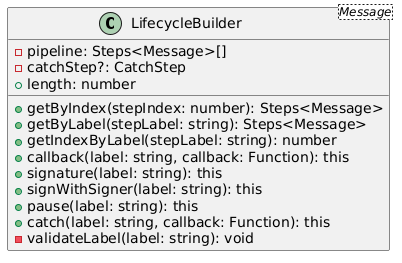Lifecycle API Reference
This document provides a concise API reference for the Lifecycle Management component within the Hedera DID SDK for JavaScript.
Classes
LifecycleBuilder
The LifecycleBuilder class provides a fluent interface for defining the steps involved in a DID operation.
Methods
callback
callback(label: string, callback: (message: Message, publisher: Publisher) => Promise<void> | void): LifecycleBuilderAdds a callback step to the lifecycle.
- Parameters
-
-
label: A unique identifier for the callback step. -
callback: A function that will be executed asynchronously. It receives aMessageobject and aPublisherobject as parameters, which provides access to data and utilities within the lifecycle.
-
- Returns
-
The
LifecycleBuilderinstance for method chaining.
signature
signature(label: string): LifecycleBuilderAdds a signature step to the lifecycle. This step is used to add signature to the message using the provided signature as an option in lifecycle runner.
- Parameters
-
-
label: A unique identifier for the signature step.
-
- Returns
-
The
LifecycleBuilderinstance for method chaining.
signWithSigner
signWithSigner(label: string): LifecycleBuilderAdds a signing step with a Signer class to the lifecycle. This step uses the Signer provided in the lifecycle runner to sign the data.
- Parameters
-
-
label: A unique identifier for the sign with signer step.
-
- Returns
-
The
LifecycleBuilderinstance for method chaining.
pause
pause(label: string): LifecycleBuilderAdds a pause step to the lifecycle. This allows for manual intervention or waiting for external events before continuing the execution.
- Parameters
-
-
label: A unique identifier for the pause step.
-
- Returns
-
The
LifecycleBuilderinstance for method chaining.
catch
catch(label: string, callback: (error: unknown) => void | Promise<void>): LifecycleBuilderAdds a catch step to the lifecycle. This step is used to handle errors that occur during the execution of previous steps.
- Parameters
-
-
label: A unique identifier for the catch step. -
callback: A function that will be executed if an error occurs. It receives the error object as a parameter.
-
- Returns
-
The
LifecycleBuilderinstance for method chaining.
getByIndex
getByIndex(stepIndex: number): Steps<Message>Gets the step at the specified index in the lifecycle.
- Parameters
-
-
stepIndex: A number representing the index of the step to retrieve.
-
- Returns
-
A
Steps<Message>object representing the step at the specified index. - Errors
-
The following exceptions may arise during the execution of the
getByIndexfunction:
| Exception code | Description |
|---|---|
|
Step index out of bounds. |
getByLabel
getByLabel(stepLabel: string): Steps<Message>Gets the step with the specified label in the lifecycle.
- Parameters
-
-
stepLabel: A string representing the label of the step to retrieve.
-
- Returns
-
A
Steps<Message>object representing the step with the specified label. - Errors
-
The following exceptions may arise during the execution of the
getByLabelfunction:
| Exception code | Description |
|---|---|
|
Step with label # does not exist. |
getIndexByLabel
getIndexByLabel(stepLabel: string): numberGets the index of the step with the specified label in the lifecycle.
- Parameters
-
-
stepLabel: A string representing the label of the step to retrieve.
-
- Returns
-
A number representing the index of the step with the specified label.
- Errors
-
The following exceptions may arise during the execution of the
getByLabelfunction:
| Exception code | Description |
|---|---|
|
Step with label # does not exist. |
LifecycleRunner
The LifecycleRunner class is responsible for executing a Lifecycle.
Methods
constructor
constructor(builder: LifecycleBuilder<Message>): LifecycleRunnerInitializes a new LifecycleRunner instance.
- Parameters
-
-
builder: ALifecycleBuilderobject representing the lifecycle steps.
-
- Returns
-
A new
LifecycleRunnerinstance.
process
process(
message: Message,
options: LifecycleRunnerOptions,
): Promise<RunnerState<Message>>Starts the execution of the lifecycle.
- Parameters
-
-
message: The initial message to be processed by the lifecycle. -
options: ALifecycleRunnerOptionsobject providing additional options for the lifecycle runner, like thePublisherandSignerinstances.
-
- Returns
-
A
Promisethat resolves to aLifecycleStateobject, which contains information about the current state of the lifecycle and processed message. - Errors
-
The following exceptions may arise during the execution of the
processfunction:
| Exception code | Description |
|---|---|
|
Signature and verifier are required for the signature step. |
|
Signer is missing, but required. |
resume
resume(
state: RunnerState<Message>,
options: LifecycleRunnerOptions,
): Promise<RunnerState<Message>>Resumes the execution of a paused lifecycle.
- Parameters
-
-
state: TheRunnerStateobject representing the paused state of the lifecycle. -
context: ALifecycleRunnerOptionsobject providing additional options for the lifecycle runner, like thePublisherandSignerinstances.
-
- Returns
-
A
Promisethat resolves to aRunnerStateobject, which contains information about the current state of the lifecycle. - Errors
-
The following exceptions may arise during the execution of the
resumefunction:
| Exception code | Description |
|---|---|
|
Signature and verifier are required for the signature step. |
|
Signer is missing, but required. |
onComplete
onComplete(label: string, callback: (message: Message,) => void | Promise<void>): voidRegisters a callback to be executed when the lifecycle step with the specified label is completed.
- Parameters
-
-
label: The label of the lifecycle step. -
callback: A function to be executed when the step is completed.
-
Component Implementation
The Hashgraph DID SDK provides the Lifecycle Management classes and interfaces within its lifecycle package. For further details, refer to the @hashgraph-did-sdk-js/lifecycle package documentation.

